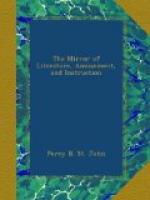Of course, it is easy enough for any enthusiast to put such words as the following into the mouth of a man who has been reviled and attacked by thousands; but we hope, for the credit of the reading world, that such stories as the following, seldom find implicit credence. There may, however, be some foundation for the following romaunt, and probably the incident, however slight, was too tempting to be sent forth to the world unadorned. If Lord Byron ever uttered such words as are here attributed to him—“I am still an Atheist”—it must have been in a fit of the most malignant obstinacy that ever distorted and disgraced the human mind—or perhaps in that spirit of malicious banter with which he was accustomed to torment his best and nearest friends. That such was his genuine sentiment, we can never bring ourselves to believe; and whatever standing is possessed by us in the world, should willingly be staked upon this point. As a romance of the pen, and not as a pure narrative of facts, we trust the following will be received; for, as such alone is it presented to our readers.]
Lord Byron during his stay at Athens, lodged at the Capuchin Convent. The Reverend Father Paul had found favour in the sight of this surprising genius;—his age, his profession, his gentleness, had gained him the affection of that nobleman in such a manner, that he devoted himself to him with all the caprice of his character. Wearied with everything, oppressed by his familiar demon, Byron came one day to find Father Paul, and request his hospitality.
The monk on seeing him reminded him of the words of the last conversation they had had together—“You cannot convince me, I am still an Atheist.” Instead of replying, Byron requested the Father to permit him to inhabit a cell, and relieve him from the ennui which poisoned his life. “While uttering these words,” said Father Paul, “he pressed my hands, and called me his father; the locks of his hair, dripping with perspiration, covered his forehead; his face was pale, his lips trembled: dared I to ask him the cause of his melancholy?”—“My father, all your days are like each other; as for me, I shall always be a traveller.”—“Have you no country? If the feeling of absence causes your sorrow, depart; my prayers and good wishes will accompany you to England.”—“Speak not to me of England; I would rather be dragged in chains on the sands of Libya, than revisit places imprinted with the curse which I have given them. The injustice of men has made England odious to me; it has separated us for ever; after the death of man, however, if it be true that the soul survives, I should be delighted to inhabit it, as a pure spirit. This mystery is only known to God.”—“Well, if you have renounced your country, take care to give your mind occupation, without too great exertion of your fancy. Is it the fault of the Creator if men are misled by false doctrines? God never




